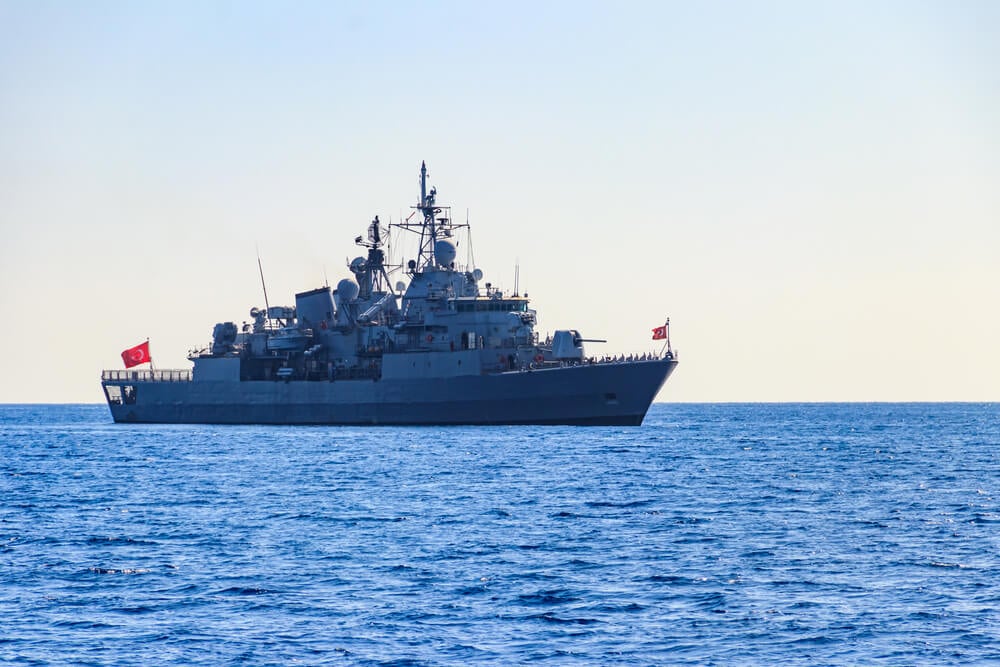Resolving long-standing tensions between Greece and Turkey would help to bolster Donald Trump’s Nobel Prize ambitions and such a goal looks to be on his administration’s to-do list.
“Together we will end this Greek-Turkish thing,” said Tom Barrack, the US ambassador to Ankara, referring to himself and Kimberly Guilfoyle, newly appointed US ambassador to Athens. “She is my friend and I adore her,” he told Greek Reporter.
But hours later, a meeting between Greek Prime Minister Kyriakos Mitsotakis and Turkish President Recep Tayyip Erdogan on the sidelines of the UN General Assembly in New York was postponed at Ankara’s request because of a scheduling clash.
A meeting may now take place next week during a European Political Community informal summit in Copenhagen. But it would be hard to find optimism the meeting would resolve what Greek media call “controlled tensions” between the two sides.
The most difficult moment in bilateral relations
Officials say the two countries are experiencing the most difficult moment in bilateral relations in more than two years, amid disputes over the delimitation of territorial waters in the Aegean and Eastern Mediterranean as well as the status of demilitarised Greek islands.
There are also diverging interests in Libya, Egypt, Syria and Cyprus, not to mention opposing opinions on Turkey’s participation in Europe’s defence plans, all of which require close attention from even the most committed students of Eastern Mediterranean politics.
The Greek opposition left-wing Syriza party complained of the “marginalisation” of Greece in regional affairs
Turkey’s cancellation of the leaders’ meeting caused consternation in the Greek media, while Turkey was more occupied with Erdogan’s planned meeting with Trump this week.
The Greek opposition left-wing Syriza party complained of the “marginalisation” of Greece in regional affairs. The Greek Communist Party, still a relative force in Greek opposition politics, linked the meeting’s cancellation to ongoing Turkish-US negotiation on arms deals.
Lack of clarity is an ongoing potential flashpoint
Both Nato members, Greece and Turkey’s centuries-long animosities spill over in present-day disputes that have defied resolution as the two countries seek energy, defence and geopolitical advantages over the other.
Athens has made clear that Ankara must lift a 30-year-old war threat if it and Cyprus are to allow Turkey access to the EU’s new arms-buying fund called Security Action for Europe (SAFE).
In 1995, the Turkish parliament declared a "casus belli", or cause for war, if Greece unilaterally expanded its territorial waters beyond six nautical miles in the Aegean Sea.
Greece and Turkey have yet to demarcate maritime zones on their border, and the lack of clarity is an ongoing potential flashpoint.
Greece is pushing ahead with a national Maritime Spatial Plan, submitted to the EU in April, that defines where activities including fishing, sea transport, tourism, aquaculture and renewable energy projects can take place.
Greece rejected Turkey’s plan for putting the maritime zones of some Greek islands under Turkey’s jurisdiction
In June, Mitsotakis announced legal procedures for the creation of Greece’s first two marine parks in the Ionian Sea and in the Southern Cyclades region of the Aegean Sea.
Soon after, Turkey claimed that effectively half of the Aegean Sea falls under its area of maritime influence in a maritime spatial plan submitted to Unesco. Greece rejected Turkey’s plan for putting the maritime zones of some Greek islands under Turkey’s jurisdiction.
Turkey is particularly focused on the areas around Greece’s Dodecanese islands, which, according to Turkey, are not entitled to full maritime zones beyond six nautical miles. Greece says this is against international maritime law.
Turkey’s maritime plan also extends to the boundaries outlined in a 2019 Turkish-Libyan maritime memorandum, which could open the door to Turkish oil exploration but which Athens rejects as illegal.
A €2 billion project facing delays
Adding to tensions is Greece’s announcement earlier this month that a consortium led by US energy company Chevron has submitted a bid to explore for natural gas in four deep-sea blocks off the Peloponnese peninsula and south of the island of Crete.
Turkey contests Greece’s rights around Crete under Ankara’s 2019 Libya agreement, which is not recognised by many countries and was reached with the Tripoli-based government. Since then, Greece has stepped up contacts with Khalifa Haftar, who controls eastern Libya.
 Last summer, Turkey dispatched warships to prevent surveys being carried out in the waters around the Greek island of Kasos
Last summer, Turkey dispatched warships to prevent surveys being carried out in the waters around the Greek island of Kasos
Greece appears to hope that Chevron’s involvement will help to counter Turkey, but this may be risky given Trump’s seemingly close ties with Erdogan and his overall erratic behaviour.
Greece is also promoting the Great Sea Interconnector (GSI), a planned 760-mile electricity cable at a depth of more than 2 kilometres linking Greece, Cyprus and Israel. The €2 billion project was launched in 2022 with a planned completion by the end of 2023, but many difficulties continue to delay it.
It emerged this month that European prosecutors are investigating possible criminal offences relating to the GSI. A Greek operator took over the project in 2023, replacing a Cyprus-based project manager.
Last summer, Turkey dispatched warships to prevent surveys being carried out in the waters around the Greek island of Kasos. But Greece says Turkey is not required to give approval for the project because there are no plans to drill on the seabed, just to lay a cable on it.
Furthermore, in what Greek media dubbed a Cypriot “bomb”, Cyprus earlier this month expressed concerns over the viability of the whole GSI project.
Turkey also has a long-standing dispute over energy reserves around Cyprus, which remains split in two since a Turkish invasion in 1974 in response to a Greek-inspired coup. There have been no serious peace talks on Cyprus since UN-led efforts collapsed in 2017.
Trump would have to succeed where many others have failed to resolve the Cyprus question if Washington is to “end this Greek-Turkish thing.”